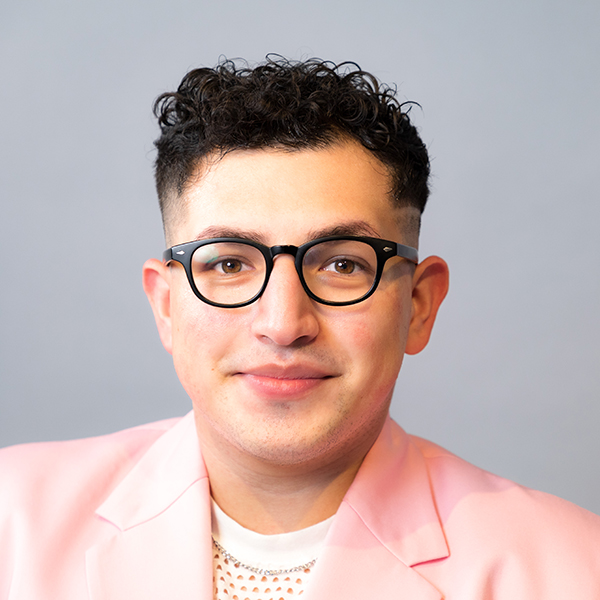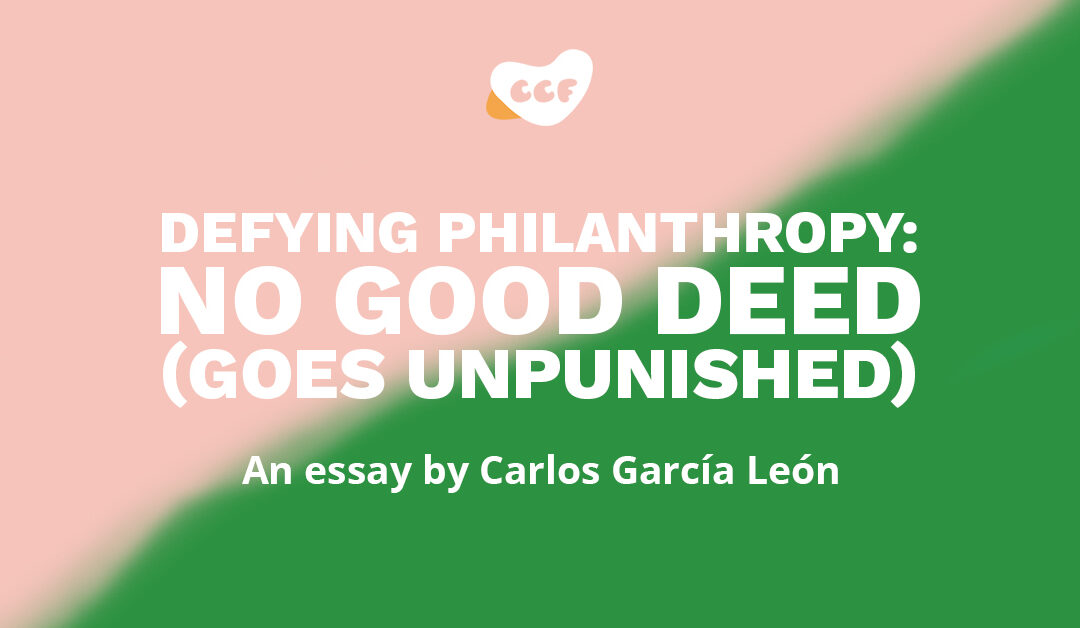By Carlos García León, anti-capitalist fundraiser, nap taker, and arts lover
…a white woman hates a woman of color for simply not being white, and a woman of color has a disdain for a racist woman. And yet, somehow, the grace of the kingdom is given to the white woman. I don’t have to tell you what a familiar experience this is for those of the global majority.
With the recent film release of Wicked, it feels right to unpack one of the many topics that come up in the musical: doing good. It is rather relevant to our field of fundraising and philanthropy – a sector filled with people who think they are “doing good,” as philanthropists like to say, “for the love of humanity.”
However, before we start this walk down the yellow brick road, we have to put those bricks down. If you are new to the film or already over it, there is some history to talk about when it comes to the movie.
This latest iteration is taken from the musical that premiered on Broadway back in 2003, starring the now widely known Idina Menzel and Kristin Chenoweth as Elphaba and Glinda, respectively. The musical is based on a book, Wicked: The Life and Times of the Wicked Witch of the West, by Gregory Maguire, published in 1995. This revisionist fiction is the tale of what and who the characters of Oz are before our beloved Dorothy storms in.
So now, the stage is set. The curtains (and the man behind them) are ready. Let’s go down, down, down the road. (Yes, I can bring in Agatha All Along, too!)
Of course, as always, one begins to question why a musical has anything to do with philanthropy and politics. To that, I must answer you with a question: What is art but not a reflection of socio-politics? From Shakespeare to The Christmas Carol to Maguire’s novel, the themes are always there. If they are not, then you must wonder what sort of privilege the art has for it to be omitted from the story which continues the socio-politics of it all.
In this Oz world, we come to discover that the Wonderful Wizard is just a conman who has fooled a whole country through massive propaganda, rewriting the history of the land, and encaging and taking away the voices of those who oppose any of his ideals. Oh, this sounds a lot like the current U.S. landscape. Huh? So odd!
So much for wonderful, right? But what about the “goodness” of the good witch, Glinda? Well, as we see in the film, portrayed wonderfully by Ariana Grande, her “goodness” is always about making her look good. A classic case of white feminism.
Not that Ms. Glinda would know what feminism is – which is truly another checkpoint of white feminism. As we hear in the film through the song “What is this Feeling?” without even getting to know Elphaba, Glinda has a hatred of her that stems from her green-color skin (racism, if it was too subtle), so much so that the rest of the students “are all on her side. [All] share this feeling.” That feeling being one of loathing.
Put in another way, a white woman hates a woman of color for simply not being white, and a woman of color has a disdain for a racist woman. And yet, somehow, the grace of the kingdom is given to the white woman. I don’t have to tell you what a familiar experience this is for those of the global majority.
The song “Popular” is just a white woman telling a woman of color how to act and behave to be treated better instead of fighting the root cause of the mistreatment, ending the song with “just not quite as popular as me.” Telling us that no matter how much you assimilate or “be good,” they’ll never consider you an equal.
Proximity to whiteness will give you short-term benefits and privilege, but it will never save you, it will not liberate you, and it will not liberate others who look like you.
Those last sentences are something I want to re-emphasize to the folks of the global majority who continue voting against the rights of their kin folk. Proximity to whiteness will give you short-term benefits and privilege, but it will never save you, it will not liberate you, and it will not liberate others who look like you.
So what does our green-hued Elphaba do after realizing this and escaping the clutches of the Wizard? Run away to recoup, strategize, and find community. She’s aware that “Dancing Through Life,” as lovely as that sounds, is playing straight into the Wizard’s game. Let me tell you, I too, wish I could become more naive and be unaware of the injustices happening in our world and the continued harm that the nonprofit industrial complex embedded and intertwined with philanthropy have and are doing. Yet, that’s a short-term wish to minimize long-term harm. A realization that our charming love interest, Fiyero, discovers as he experiences and witnesses the maltreatment of those around him.
In Act II of the musical, when Elphaba sings “No Good Deed,” the lyrics are:
“One question haunts and hurts
Too much, too much to mention
Was I really seeking good
Or just seeking attention?
Is that all good deeds are when looked at with an ice-cold eye?
If that’s all good deeds are
Maybe that’s the reason why
No good deed goes unpunished”
I’m particularly fond of this as I think of philanthropy. Top of mind is name recognition of buildings, stages, and other physical items. Or we have the simple yet time-consuming and tedious program recognition on websites and paper materials.
So we return to the question that haunts our wicked witch (and me, honestly), “Is giving really doing good, or is it seeking attention?” Can it be both? Sure, but then can it ever be really good if it also seeks attention?
As Edgar Villanueva writes in his book Decolonizing Wealth: Indigenous Wisdom to Heal Divides and Restore Balance, “altruism is actually a fundamental reflection of the separation paradigm, the Us versus Them mindset. Altruism is the poster child for white saviors.”
And so, in this land of Oz, we see the same issues we run into in the real world: Community building for the wrong reasons. The enemies of the liberation we are all aiming towards are much better at building community than we have been. It’s easier for them. It always has been. History has shown time and time again that nothing unites folks better than a common enemy. Oz has the Wicked Witch of the West; back in the 1800s, the U.S. had Irish immigrants; in the 1980s, the homosexuals during the AIDS epidemic and the Reagan administration; Muslim folks after 9/11 and the Bush administration – and still to this day, honestly. Othering is a tactic that is not new, and yet somehow, we are still not great at combating it.
If we are to continue on this journey of “love of humanity” for the sake of philanthropy, then we have to embrace the ugliness of our histories–whether personal or institutional. To truly defy philanthropy the same way that Elphaba defies gravity, we have to love ourselves in all aspects of ourselves; we must come to be at peace with the darkness that has been socialized and enacted by others that we have internalized as common and normal. Elphaba gains her powers once she realizes that she is powerful because she is different.
The story of the tragic anti-heroine of this tale doesn’t have a happy ending, per se, but we can still learn lessons from her. Defy gravity. Fight for the oppressed. Read a book. Wash away the critiques of your enemy. Be loud. Take care of yourself when you need it. Trust that others will pick up when you cannot. Pick up when others cannot and you can.
If you get the chance to engage in the material, whether through the book, the musical – that is still running and occasionally touring – or the new film, I hope that you get the notion to be a little wicked.
This world may have too many Glindas, Wonderful Wizards, and submissive Ozians, and this world deserves more people flying, perhaps not on brooms, but flying nonetheless.

Carlos García León
Carlos García León (he/they; el/elle) is a queer, non-binary, Latine, Mexican-Statesian, and arts fundraiser. They were born in Atlixco, Puebla, Mexico, and reside in the stolen land of the Peoria, Potawatomi, Kickapoo, and Kaskaskia tribes, also known as Chicago, Illinois. Currently, Carlos is gratefully employed as the Assistant Director of Development at Lookingglass Theatre Company. Their work is driven by a fight for cultural equity, decolonizing the arts, and social justice. As such, Carlos describes themselves as an anti-capitalist, community-centric, theoretical fundraiser.
Carlos has spoken at multiple conferences introducing the concept of Community-Centric Fundraising and building a more gender-inclusive workplace to hundreds of attendees. Carlos holds a B.M. in Bassoon Performance from the University of Illinois at Urbana-Champaign, and a M.A. in Arts Administration and an MBA from the University of Cincinnati. Outside of working and writing, Carlos is a poet, writer, and fledgling kickboxer. They enjoy their leisure time by hanging with friends, resisting capitalism by taking naps, dancing to Latin, disco, and house music, and exploring new Chicago food spots. They can be reached via email or on Instagram, Twitter, and other social media platforms @cgarcia_leon. Tip them for their work via Venmo @cgarcia_leon or via PayPal using their email.
Discover more from CCF
Subscribe to get the latest posts sent to your email.


Thank you for a great article. I really recommend Kaz Rowe’s video on Wicked, their content is always well researched and presented. Gives you more of a deep dive on the book and the queerness that was included in the book but dropped in subsequent adaptations. Apologies if I am telling you what you already know (geez, what a white person thing to do, huh?)
Is opting to, even if just at times, “dance through life” a chance to make change from within and receive public validation? To wit, this example:
https://www.youtube.com/watch?v=6ZNniTmsPdw
I really enjoyed your article.